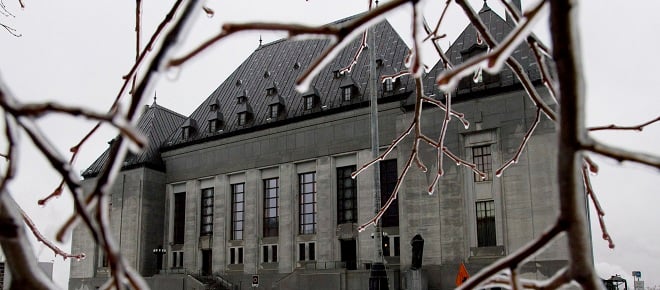The Prudent Court: Anti-terrorism, charter rights and judicial caution
Supreme Court maintains cautious balance between national security concerns and individual rights
Ice coats tree branches outside of the Supreme Court of Canada Monday December 10, 2012 in Ottawa. Lawyers for eight Canadians challenging the outcomes of the last federal election in six closely contested ridings are in Federal Court this morning arguing that the results should be overturned because of alleged voter-suppression tactics.THE CANADIAN PRESS/Adrian Wyld
Share

A set of Supreme Court of Canada rulings last Friday upholding anti-terrorism provisions of the Criminal Code came as little surprise to those familiar with the court’s post-9/11 national security decisions.
The court, like its counterparts in many Western democracies, has faced the central challenge of balancing national security concerns with individual rights. Civil libertarians have been concerned that anti-terror laws are constructed in a way that infringes due process, violates privacy rights and leads to racial profiling.
The Canadian court’s record in national security cases can be summarized as cautious. Its decisions have been imbued with a vigilant rhetoric about rights but also a general prudence about the legitimate policy objectives at stake.
Just four months after 9/11, a unanimous Court ruled that deporting suspected terrorists to countries where they could face torture was unconstitutional, while at the same time articulating a broadly deferential approach to ministerial determinations of the likelihood of torture and (disturbingly) leaving the door open to “exceptional circumstances” where deportation to torture might be justified.
In 2004, a majority of the court upheld provisions of the Anti-Terrorism Act that provided for investigative hearings, which granted judges the power to compel a person who has information to appear before them and answer questions. The justices determined that there were appropriate safeguards (immunity protections and the preservation of the right against self-incrimination) to allow the provisions to stand.
Three years later, the court unanimously struck down particular aspects of the security certificates regime that allow for foreign nationals or permanent residents to be indefinitely detained. The law had prevented detainees from knowing the case against them, thus impairing their right to a fair hearing. The justices gave Parliament a year to craft new provisions to remedy the infringement.
The court will be revisiting the security certificates regime in the Mohamed Harkat case next year, and it will be interesting to see how it deals with the fundamental problem it avoided addressing in the 2007 case: individuals believed to be security threats are detained or have conditions imposed on their freedom indefinitely, without criminal charges being brought forward, but they also can’t be deported because they would likely face torture. It is a seemingly intractable rights conundrum generated by our respect for rights.
The justices have also had to deal with the Canadian government’s role in the detention of Omar Khadr at Guantanamo Bay. In 2008 the court unanimously ruled the charter applied to the conduct of Canadian officials, ordering the disclosure of documents related to CSIS interviews with the teenager conducted in 2003.
Two years later, the court ruled that Khadr’s charter rights were violated by his continued detention, but stopped short of ordering the government to seek his repatriation. I have criticized this remedial deference elsewhere.
Almost all of these decisions have featured a unanimous court. Further, the unanimous decisions were either written by “The Court” – a convention of authorship often reserved for the most important cases – or by the chief justice. That last week’s decisions were penned by Chief Justice McLachlin with unanimous backing stands as an important continuation of that trend (and it comes at a time when the chief has been in dissent in a string of cases in other areas of law).
One of the major issues the court faced in Friday’s cases was whether the definition of terrorism, which states that a terrorist activity must be an act or omission committed in whole or in part “for a political, religious or ideological purpose, objective or cause” violates freedom of expression, religion and assembly under section 2 of the Charter of Rights. The appellants argued that this “motive clause” produces a “chilling effect,” effectively criminalizing the expression of beliefs and opinions.
McLachlin was fairly blunt in her assessment of this claim, noting that violence or the threat of violence are not protected forms of expression. Reading the anti-terror provisions in context and in a manner consistent with their purpose, the court determined its focus is on prohibiting violent acts. Further, as the chief justice points out, the anti-terror sections of the code “expressly declares that “terrorist activity” within the meaning of the Criminal Code does not include the non-violent expression of a political, religious or ideological thought, belief or opinion.”
The chief justice also took pains to address concerns about racial or religious profiling:
“Criminal liability should not be based on a person’s political, religious or ideological views. Police should not target people as potential suspects solely because they hold or express particular views. Nor should the justice system employ improper stereotyping as a tool in legislation, investigation or prosecution. In the present case, the impugned provision is clearly drafted in a manner respectful of diversity, as it allows for the non-violent expression of political, religious or ideological views. It raises no concerns with respect to improper stereotyping.”
It was a relatively easy case for the Supreme Court. Read in isolation, the “motive clause” appears troubling on the surface. But the justices placed the clause in the context of the Criminal Code’s anti-terror provisions, preserving the legitimate objectives of the law while giving a rhetorical nod to the rights concerns at issue.
Not all cases will be so straightforward. With the Harkat case landing on its doorstep, it will be interesting to see if the Court can maintain its cautious balance.
Emmett Macfarlane is an assistant professor of political science at the University of Waterloo. You can follow him on Twitter @EmmMacfarlane